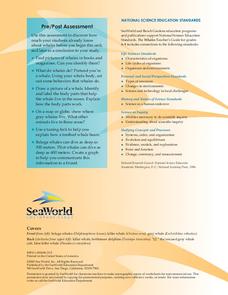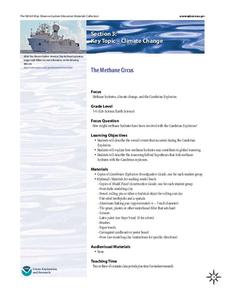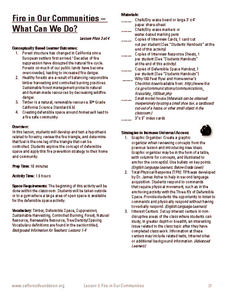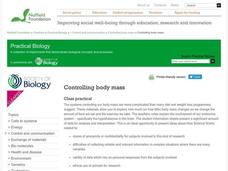Curated OER
Why Can’t I Have Sugar? All About Diabetes
Begin the lesson by having your class write what they know about diabetes. They learn through a skit how the body metabolizes glucose. A visual representation of the two types of diabetes is displayed, and then learners participate in...
Berkshire Museum
Backyard Rocks
You don't have to travel far to learn about rocks, just step outside, pick up a stone, and begin investigating. After taking a class walk around the school grounds collecting rocks, young scientists practice their skills of observation...
Rural Science Education Program
Bees and Flowers – Partners in Pollination
Why are bees so important? After several activities where kids investigate the form and function of flowers, they learn about the different types of bees and label them. They then examine pollen under a microscope and decide which bees...
American Museum of Natural History
What is Astronomy?
Go study the universe. Pupils learn seven aspects about astronomy and astronomers. They begin to learn about constellations; distance and motion between objects; gravity; the electromagnetic spectrum; dark matter and energy; and teams of...
Curated OER
Moon Mining
Go on a moon mining expedition from the safety of your classroom with this space exploration simulation. Using simple models of the moon's surface prepared ahead of time by the teacher, young scientists are challenged with locating and...
Sea World
Whales
A whale of a lesson is sure to intrigue your elementary oceanographers! Learn about the mammals of the sea with a series of activities about whales, dolphins, and porpoises. Kids complete worksheets about the anatomy of a whale, create a...
San Francisco Public Utilities Commission
Let's Save Water: Water Conservation
Did you know that cutting down your shower by one minute a day can save five gallons of water? Learn about water conservation with a science reading activity. After kids finish reading key terms and water-saving tips in a reading...
US Environmental Protection Agency
Types of Radiation
Learn about radiation, and what everyday items produce radiation, with a series of activities about heat transfer. Kids go over basic information about electromagnetic waves and ionizing radiation before performing several experiments...
Curated OER
Relative Age Dating
Modeling dough and paper cutouts in science class? Learn about how relative age dating concepts, like the Law of Superposition and cross-cutting relationships, can be used to describe the formation of sedimentary layers.
Space Awareness
Navigation in the Ancient Mediterranean and Beyond
Ancient texts, like Homer's Odyssey, mentions navigating ships by observing constellations. Pupils learn about the link between history and astronomy as they relate to navigation in the Bronze Age. Scholars complete two hands-on...
NASA
Cleaning Water
Give young scientists a new appreciation of fresh, clean drinking water. After learning about the ways astronauts recycle their air and water, your class will work in small groups creating and testing their very own water...
Baylor College
Post-Assessment: Global Atmospheric Change
Find out how much your earth scientists learned about the atmosphere in the unit on global atmospheric change with this assessment. After writing a letter to persuade others to make changes to protect our atmosphere, pupils take the same...
Space Awareness
Britannia Rule the Waves
Could you determine longitude based on measuring time? Early explorers used a longitude clock to do just that. Scholars learn about early exploration and the importance of the invention of the clock. Then pupils build their own longitude...
NOAA
The Methane Circus
Step right up! An engaging research-centered lesson, the third in a series of six, has young archaeologists study the amazing animals of the Cambrian explosion. Working in groups, they profile a breathtaking and odd creature and learn...
Forest Foundation
Fire in Our Communities - What Can We Do?
Learn about defensible space and renewable resources with a lesson about forest fires. After exploring the ways that humans have impacted the environment, kids conduct mock interviews about differing points of view in the conservation...
Environmental Education in Wisconsin
Biome Travel Guide
In a perfect marriage of social studies and science, groups work together to research and create a travel guide presentation to share with the class. Not only do kids learn about the climate and geography of a biome, but also the...
Curated OER
More Space About Space
In this science worksheet, students seven questions about outer space. Students are encouraged to research the given website and follow any links that interest them.
Chicago Botanic Garden
Impacts of Climate Change
Scholars become experts on the eight major impacts of climate change through a jigsaw and grand conversation. They then research and present what they learned about effects specific to their region.
Science 4 Inquiry
Battle of the Waves
Which travels faster, light or sound? Scholars work in groups to simulate the ability for waves to travel through solids, liquids, gases, and through a vacuum. Then, they learn about the properties of a mystery wave and must determine...
Curated OER
Fuel Cell Experimentation
With rising oil prices and increasing concerns over global warming, the pressure is on for engineers to develop alternative sources of energy. Among the new technologies being developed are hydrogen fuel cells, which young scientists...
Teacher Printables
My Flip Book About . . .
Print these as two-sided handouts from which elementary entomologists can make a flip-style book about beetles (or a variety of other animals that are available as well). They research the habitat, food, and other interesting information...
Rainforest Alliance
Forests of Guatemala
With 90 percent of its land area covered in forests, Suriname, a country in South America, contains the largest percentage of forests throughout the world. Here is an activity that brings classmates together to learn about the...
Nuffield Foundation
Controlling Body Mass
Many variables impact your body mass, not just diet and exercise. Scholars collect and study data about body mass to better understand the complexity of a sensitive topic. They learn about leptin deficiency, the hypothalamus, and more.
BioEd Online
Muscle Fibers
What better way to learn about muscle than by dissecting one? Using cow muscle (beef), learners compare bundles of yarn to muscle fibers as they explore each. The supplemental reading about astronauts losing muscle mass in space and what...























